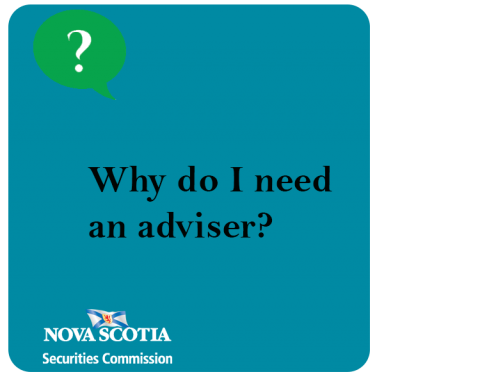Submitted by nsscadmin on

In our previous blogs posts we’ve tackled questions about what is a registered adviser, how to find the right adviser, what to do if you have problems with your adviser and how your adviser is paid. One question we haven’t answer is “Why do I need an adviser?”
Trying to manage your investment portfolio on your own can be a daunting task. We’re not saying it can’t be done, but it’s not easy keeping up with the markets, the latest investments and your investment goal while also working and managing the rest of your life.
Getting an adviser to help you meet your investing goals instead of doing it yourself typically
comes down to at least one of three things, or even a combination of them…
Lack of knowledge
How much do you really know about investing? Do you know the difference between different
types of investments? What is more beneficial for meeting your short-term and long-term goals?
Do you understand the relationship between risk and returns? There’s plenty of information out
there for someone who wants to tackle investing on their own, but that’s not always the best
option.
Lack of time
Managing your investment portfolio isn’t a one-off thing. Truly managing a diverse portfolio
of investments takes time. Your investments need to be monitored on an on-going basis and
reviewed during major life changes, such as getting married, having children or changing jobs, as well as when there are changes in the market.
Lack of interest
Everyone should be interested in how their money is working for them. However, taking an interest in your retirement or other savings and being fully involved in the process are two very different things.
That’s just the start of why you might need an adviser. Now that you know you need an adviser because keeping up with the markets and investments takes a lot of time and knowledge, what else does working with an adviser provide you?
Analyze your financial position and set investment goals
When you first meet with an adviser they should help you analyze your current financial position and determine your investment goals. You may have heard the adage “you need to know where you are to get where you want to be.” That holds true for investing as well. Knowing where you are will allow you to set realistic investment goals and timelines.
Design an investment plan
To achieve your investment goals, whether they are, saving for a house, saving for your education, retirement, etc. you need a plan. With your current situation and your investment goals determined your adviser can help you devise a plan to achieve your goals.
Design a portfolio
Another adage is don’t put all your eggs in one basket. An adviser can help you design a diverse portfolio that while not totally immune to market fluctuations, will be better prepared to handle market volatility.
Choose suitable investments
Choosing the right investments is all about suitability. What is right for one investor may not be right for another. Suitability is determined by many factors, including time horizon, risk toleration, your investment goals, how much you have to invest, etc. By asking you the right questions and knowing your situation, an adviser should be able to help you choose suitable investments.
Track your progress
You don’t just set some investment goals, make some investments and then sit back and wait. You need to track your progress. An adviser can do this for you by providing periodic updates on the value of your holdings. This will help you determine if you’re on track to meet your investment goals.
Help you adjust as necessary
The markets are unpredictable. Even if you make suitable investment and follow you plan, changing markets can deviate you away from achieving your goals. Sometime an adjustment to your investment is necessary. You adviser can help you determine when a course adjustment is necessary to get you back on track.
Now that you know what you need an adviser make sure you find the right one for you. You can get help with that in our previous blog post “How do I find an adviser that’s right for me?” and also check back next week when we look at the questions you should ask your adviser.
